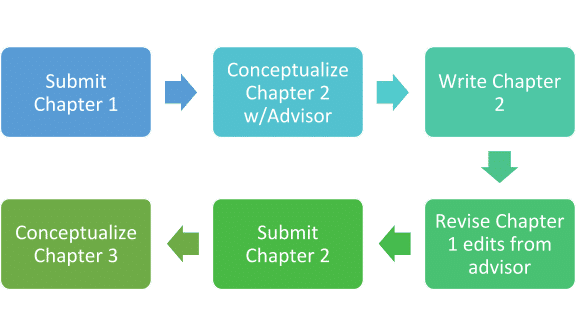This post continues our series, The Smart Scholar, on advice for doctoral students writing their dissertations.
With the beginning of the fall semester approaching (or beginning for some) this is an exciting time for doctoral students who are currently writing their dissertations. For those who are further along in the process, you are starting to plan potential dates for your proposal and complete dissertation defense. For those just starting out, now is the time to visit with your advisor and start to map out your dissertation journey. I have several years experience serving as a dissertation coach, so I wanted to provide some advice about how to navigate the dissertation process.
Create realistic timeframes
In my work supporting my Done Dissertation Coaching Program clients, we often discuss their experiences with receiving “timely” feedback. Our conversation usually leads to me asking them “Well, what is your definition of timely?” In one situation a student explained that 3-4 days should be sufficient time for their advisor to provide written feedback. My response was, “Did you write all 30 pages of your section in 3-4 days?” The student had an epiphany in this moment and realized that their expectation of this tight turnaround was unrealistic.
However, what should be a realistic timeline for receiving feedback? From my experience serving on dissertation committees and coaching private clients, I believe 3-4 weeks is an ample amount of time for receiving feedback. This allows your reader to sit with the document and provide detailed notes that will be thoughtful and will influence your work moving forward. This timeframe also takes into account the other competing priorities (e.g., teaching classes, engaging in research, living life outside of the professoriate) of your advisor.
Your next thought might be, “What should I do in the 3-4 weeks while I wait for feedback?” In the next section I describe my recommendation for using a “Submit-Write, Revise-Submit” workflow.
Develop a “Submit-Conceptualize-Write-Revise-Submit” workflow
In my students’ experience, the best method to completing a dissertation has been for them to consistently work on the dissertation, even when they are waiting on feedback from their advisor. The goal is to maintain momentum!I recommend my clients use a “Submit-Conceptualize-Write-Revise-Submit” workflow. Below is an example diagram of the process.

Approaching your dissertation in this way is effective because you are consistently working on the next chapter while your advisor is reviewing the previous chapter. Additionally, this shows your advisor your commitment to finishing your dissertation, since you have a plan in place to approach each section of the work.
Take breaks to avoid dissertation intoxication
For many doctoral students, completing the dissertation can become a stressful experience. You are managing your own expectations for the process while fielding that infamous question “When are you going to finish your dissertation?” from friends and family. While these expectations and questions may put pressure on you to constantly work on your dissertation, I recommend that you also take a day or two to step away from the project and avoid what I figuratively call “dissertation intoxication.”
From my experience working with doctoral students, “dissertation intoxication” often is evidenced by the following behaviors:
- Not engaging in sufficient amounts of sleep
- Drastically decreasing time spent with friends and family
I point these two out because sleep and engagement with friends and family are critical to your success during the dissertation process (and in life). In particular, sleeping is important because recharging your body—given the heavy cognitive requirements of engaging in the knowledge generation process—is imperative to a successful dissertation. Furthermore, questions like “When will you finish your dissertation?” are tough to bear, but spending time with family and friends is critical for your self-care. Remember, taking time for yourself is just as important as working on your dissertation!
Are you a student with more questions about the dissertation process? If so, tweet your questions to me and @Interfolio and I will create a video reply to your questions!
—
Author Bio: Dr. Ramon B. Goings is an assistant professor of educational leadership at Loyola University Maryland. His research examines gifted/high-achieving Black male academic success PreK-PhD, diversifying the teacher and school leader workforce, and the student experience and contributions of historically Black colleges and universities to the higher education landscape. Dr. Goings is also the founder of The Done Dissertation Coaching Program which provides individual and group dissertation coaching for doctoral students. For more information about Dr. Goings’ research please visit his website www.ramongoings.com and follow him on Twitter (@ramongoings) and for more information about The Done Dissertation Coaching Program visit www.thedonedissertation.com.
